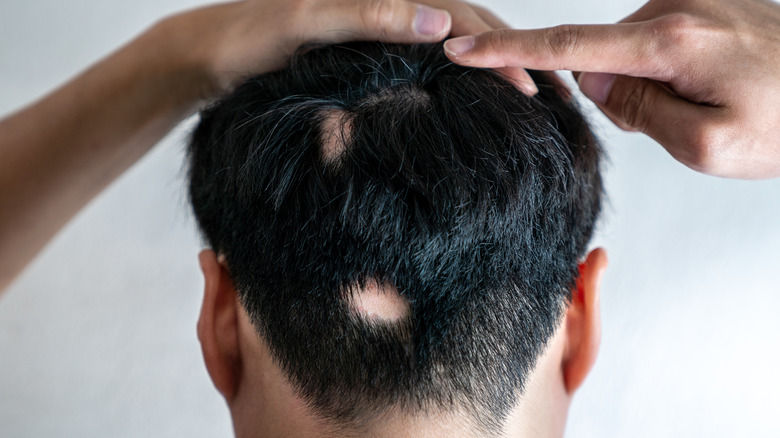What It Really Means When Your Hair Loss Is Patchy
Hair loss can be devastating. Devastating, stressful, and yet, very normal. According to WebMD, adults have approximately 100,000 to 150,000 strands of hair covering their scalp and lose about 100 a day. So don't be alarmed to have to clean out your clogged hairbrush and shower drain from time to time. That said, if you start to notice your hair loss is designated to a specific spot on your scalp, beard, or back and is starting to appear more patchy, here's what you should know.
Mayo Clinic points out that patchy hair loss can be caused by a number of reasons. Patients who are receiving cancer treatments, such as chemotherapy and radiation, often experience hair loss. In addition, a physically or emotionally stressful event can cause your hair to temporarily fall out in clumps. Bald spots could also be caused by changing hormones or hair treatments that are harmful to the scalp. If you've ruled out all of these possibilities as the cause of your patchy hair loss, then you may be seeing the side effects of a lesser-known medical condition.
Alopecia areata can affect head, body, or facial hair
Alopecia areata is an autoimmune disorder where the body attacks the hair follicle causing hair to fall out in a specific area, per the American Academy of Dermatology (AAD). While anyone can be diagnosed with this condition, research has shown that those with other disorders including thyroid disease and asthma may be more susceptible to getting alopecia areata. Those who share a family member with the condition are also at higher risk.
The patchy bald spots that happen with alopecia areata don't just affect the hair on your scalp. It could also cause patchy baldness on the body and facial hair, as well, notes WebMD. Unfortunately, this autoimmune condition doesn't have a cure. However, it usually isn't accompanied by other symptoms, and there are topical medications and corticosteroids you can take to for hair to grow back again. In fact, one study cited by AAD noted that more than 80% of people treated with corticosteroid injections for alopecia areata experienced hair regrowth. If you're dealing with excessive hair loss — patchy or in any other form — you might want to consider making an appointment with your doctor to find potential causes in your case and rule out any underlying medical conditions.


